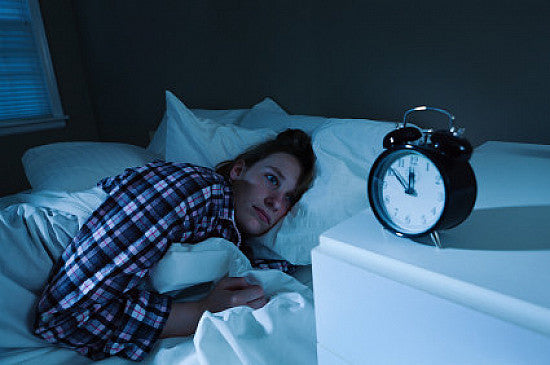Tips to Help with Sleep Anxiety: How to Calm Your Mind and Get Restful Sleep

Sleep anxiety is a common problem that affects many people. It often manifests as racing thoughts, worry about not getting enough rest, or a constant cycle of dread when bedtime approaches.
Whether you're dealing with stress from work, personal worries, or a busy mind that refuses to shut off, sleep anxiety can prevent you from getting the rest you need. However, with the right strategies, you can manage sleep anxiety and reclaim your nights.
Here are some tips to help reduce sleep anxiety and promote restful sleep:
1. Establish a Relaxing Bedtime Routine
Creating a consistent bedtime routine can help signal to your body that it’s time to wind down. Aim to follow the same steps every night, such as dimming the lights, taking a warm bath, reading a calming book, or practicing gentle stretches. A soothing routine helps shift your mind away from daily stresses and prepares your body for rest.
- Tip: Avoid stimulating activities like intense exercise, work-related tasks, or scrolling through social media before bed. Instead, focus on calming activities that help you relax.
2. Limit Screen Time Before Bed
Blue light emitted from screens can interfere with your body’s production of melatonin, the hormone that regulates sleep. Try to avoid electronic devices like smartphones, tablets, and computers at least an hour before bed. If you must use them, consider using blue light filters or night mode settings to reduce the impact on your sleep.
- Tip: Swap screen time for other relaxing activities like listening to calming music, meditating, or practicing mindfulness.
3. Create a Calm Sleep Environment
Your bedroom should be a sanctuary for sleep. Pay attention to the details that can make your space more conducive to rest. Keep the room cool, dark, and quiet. Invest in comfortable bedding and a supportive mattress to ensure that your body is fully relaxed.
- Tip: If outside noise is a problem, consider using earplugs, white noise machines, or calming nature sounds to drown out disruptions.
4. Practice Deep Breathing or Meditation
Anxiety often triggers the body’s fight-or-flight response, making it difficult to relax. Deep breathing exercises and meditation can help calm your nervous system and reduce stress. Techniques like 4-7-8 breathing (inhaling for 4 seconds, holding for 7, and exhaling for 8) can slow your heart rate and help you unwind.
- Tip: Guided meditation apps like Headspace or Calm offer specific sleep meditation sessions designed to ease anxiety and promote relaxation.
5. Use Visualization Techniques
Visualization is a powerful tool that can help ease anxiety by shifting your focus away from negative thoughts. Picture a peaceful scene in your mind, such as a quiet beach, a serene forest, or a cozy cabin. Immerse yourself in the details of this scene, imagining the sights, sounds, and smells. This can help distract your mind from anxious thoughts and lull you into a state of relaxation.
- Tip: Combine visualization with deep breathing for a more effective relaxation experience.
6. Limit Caffeine and Sugar Intake
What you consume during the day can significantly impact your ability to fall asleep at night. Caffeine, sugar, and other stimulants can keep your mind racing long after you've consumed them. Try to limit caffeine intake to the morning hours and avoid sugary foods, especially in the afternoon and evening.
- Tip: Opt for calming herbal teas like chamomile or peppermint in the evening to help promote relaxation without the jitters.
7. Challenge Negative Thoughts
Anxiety is often fueled by negative thought patterns. If you find yourself lying in bed worrying about not getting enough sleep, try to challenge these thoughts with logic and reason. Remind yourself that even if you don’t get a perfect night’s sleep, you’ll still be able to function the next day. By reframing your thoughts, you can reduce the pressure you’re putting on yourself to fall asleep.
- Tip: Keep a journal by your bedside to jot down any anxious thoughts that arise. This can help you release them from your mind and prevent them from spiraling.
8. Consider Cognitive Behavioral Therapy for Insomnia (CBT-I)
Cognitive Behavioral Therapy for Insomnia (CBT-I) is a proven method for treating sleep anxiety and insomnia. It helps you identify and change negative thought patterns and behaviors that contribute to sleep problems. Working with a therapist trained in CBT-I can give you the tools to manage your anxiety and improve your sleep quality over time.
- Tip: Many CBT-I programs are available online, making it easier to access this effective treatment.
9. Set Realistic Expectations
Perfectionism can exacerbate sleep anxiety. It’s important to understand that no one sleeps perfectly every night. Accepting that occasional restless nights are normal can help reduce the pressure you place on yourself to fall asleep. Focus on improving your overall sleep habits and being kind to yourself when things don’t go as planned.
- Tip: Aim for progress, not perfection. Celebrate small victories, like feeling more relaxed before bed, rather than focusing solely on sleep duration.
Sleep anxiety can be challenging, but with the right techniques, you can create a calmer, more restful bedtime experience. By establishing a relaxing routine, creating a peaceful sleep environment, and practicing mindfulness, you can reduce anxiety and improve the quality of your sleep. Remember that it's a process, and finding what works best for you may take time. However, with patience and persistence, you can regain control over your sleep and wake up feeling more refreshed and at ease.




